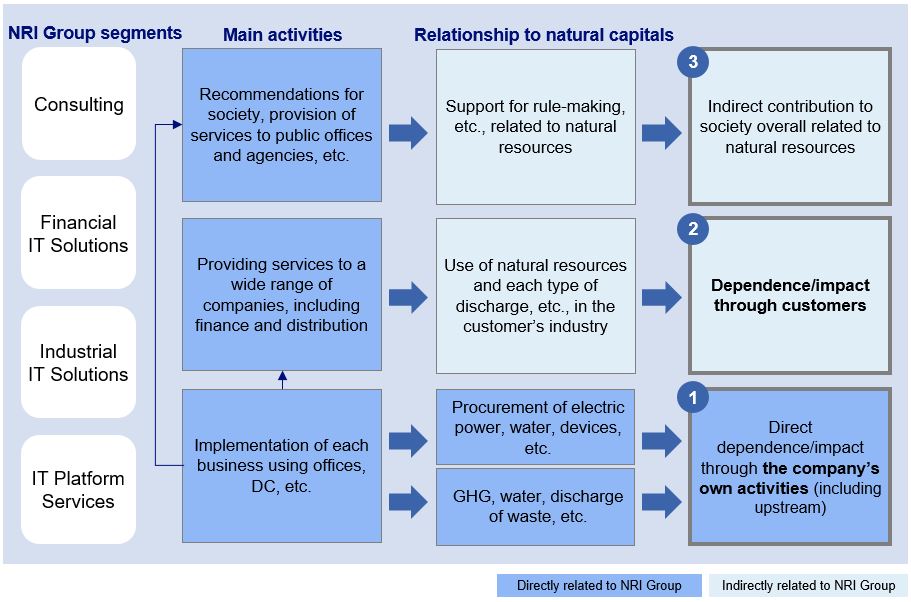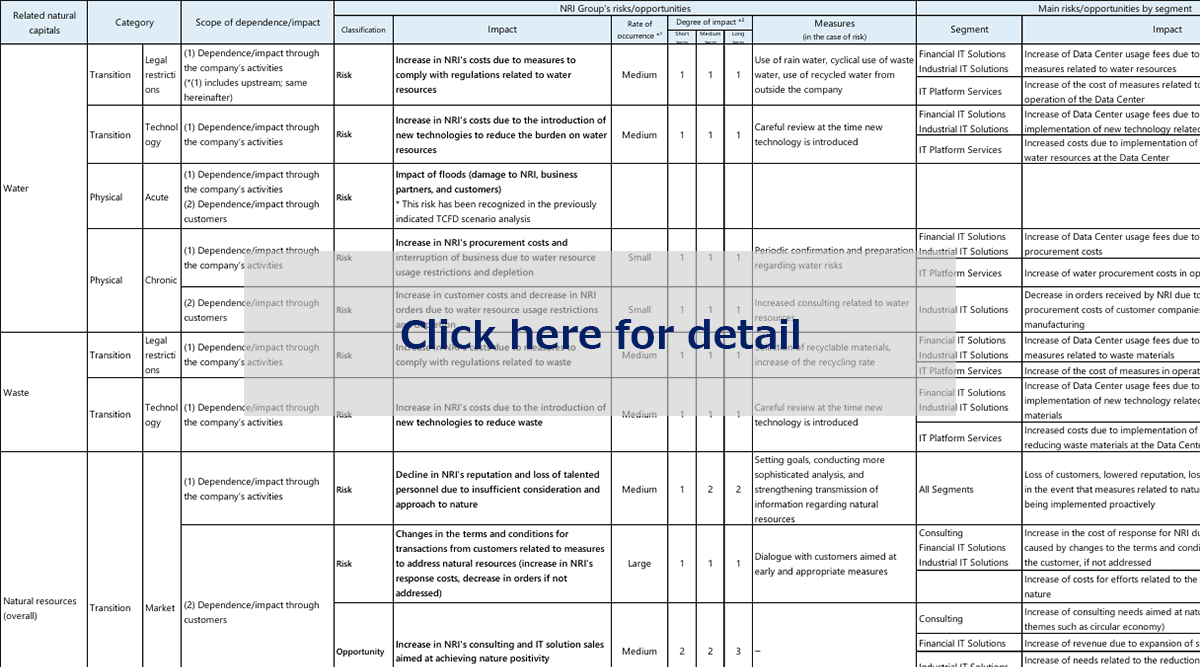Identification of Risks and Opportunities from Natural Capitals (TNFD Scenario Analysis)
Recognition of points of contact with nature
Since July 2022, the NRI Group has participated in the TNFD Forum and advancing scenario analysis, with the Locate, Evaluate, Assess, Prepare (LEAP) approach outlined in the TNFD disclosure framework as a reference.
In conducting the analysis, the NRI Group first grasped the general points of interaction between its business and nature. Specifically, the NRI Group's value chain was laid out to provide an understanding of the relationship of dependency and impact each element has on nature, with tools such as ENCORE* as a reference. As a result, three main points of interaction were identified. These are (1) interaction related to Data Center and office use (including upstream in the value chain such as energy and equipment procurement), (2) interaction with recipients of services such as IT solutions and consulting (downstream in the value chain), and (3) indirect interaction through societal change initiatives like recommendations for society and consulting services.
- *
ENCORE (Exploring Natural Capital Opportunities, Risks and Exposure): A web-based tool provided by Natural Capital Finance, among others, which allows understanding of the potential dependencies and impact on nature of 157 industries based on GICS. It is also used by TNFD as a useful tool for referencing in Scoping and the Locate step of LEAP, etc.
Points of contact between the NRI Group’s business and nature

Identification of risks and opportunities for the NRI Group based on LEAP analysis
Based on these results, further examination has been conducted from FY2023 onward to identify nature-related risks and opportunities. During the Locate and Evaluate stages, the NRI Group's relationship of dependence and impact on nature, including geographical information, was investigated in more detail. NRI employed ENCORE, guided by TNFD principles, to thoroughly assess its nature-related dependencies and impacts across business activities. The results are presented as a heat map. As a result, it was found that the NRI Group primarily impacts nature through water usage, waste disposal, and greenhouse gas emissions in Data Centers and offices. In particular, it was confirmed that the Data Centers are highly dependent on water resources. The detailed impact of greenhouse gas emissions is as described in the previously mentioned TCFD scenario analysis.
Regarding water and waste discharge, the amounts are minimal compared to overall regional discharge, and based on analyses including those from WRI Aqueduct, it is currently believed that the NRI Group's operations alone do not significantly alter the state of nature.NRI has confirmed that water use at its data centers is primarily for cooling equipment and does not significantly affect water quality. Wastewater is carefully managed to ensure full compliance with national and local water regulations, with no discharges exceeding permitted standards. In addition, some of the NRI Group's sites are adjacent to wildlife conservation areas, but there has been no immediate impact on these areas due to the Group's operations. The impact on nature at these sites will continue to be monitored closely.
In the Assess stage, considering the interactions and dependencies/impact on nature mentioned above, a scenario analysis was conducted to understand the potential future risks and opportunities for the NRI Group. The following risks and opportunities were identified as a result of the analysis.
In the Prepare stage, based on the above analysis results, the goals outlined in the "Indicators and Targets" section were set. As TNFD recommends setting science-based targets for nature (SBTs for Nature), we will continue to monitor these trends and conduct further analysis, periodically revising the targets as needed.
Risks, opportunities, and financial impact related to natural resources for the NRI Group (261KB)
